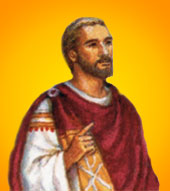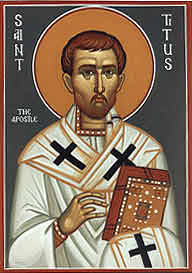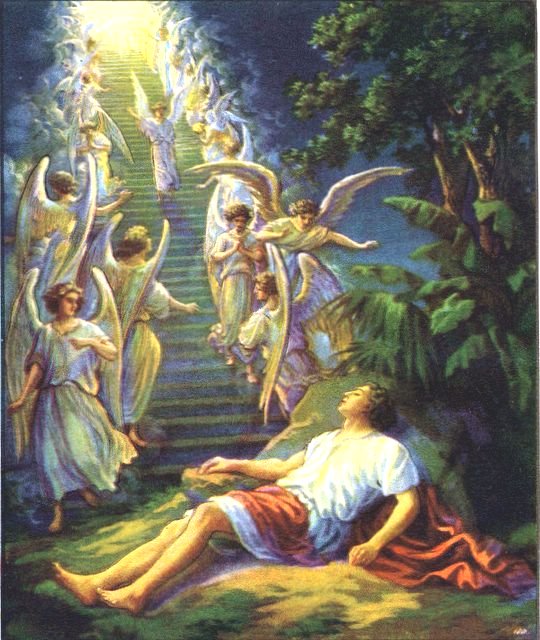Then it seemed good to the apostles
and the elders, with the whole church, to choose men from among them and send them
to Antioch with Paul and Barnabas. They sent Judas called Barsabbas, and Silas, leading men among the brothers…. And Judas and Silas, who were
themselves prophets, encouraged and strengthened the brothers with many words.
As we were going to the place
of prayer, we were met by a slave girl who had a spirit of divination and brought
her owners much gain by fortune-telling. She followed Paul and us, crying out, “These
men are servants of the Most High God, who proclaim to you the
way of salvation.” And this she kept doing for many days. Paul, having become greatly
annoyed, turned and said to the spirit, “I command you in the name of Jesus Christ
to come out of her.” And it came out that very hour.
But when her owners saw that
their hope of gain was gone, they seized Paul and Silas and dragged them into the
marketplace before the rulers. And when they had brought them
to the magistrates, they said, “These men are Jews, and they are disturbing our
city. They advocate customs that are not lawful for us as Romans to accept or practice.”
The crowd joined in attacking them, and the magistrates tore the garments
off them and gave orders to beat them with rods. And when they
had inflicted many blows upon them, they threw them into prison, ordering the jailer
to keep them safely. Having received this order, he put them into the inner prison
and fastened their feet in the stocks.
About midnight Paul and Silas
were praying and singing hymns to God, and the prisoners were listening to them,
and suddenly there was a great earthquake, so that the foundations of
the prison were shaken. And immediately all the doors were opened, and everyone's
bonds were unfastened. When the jailer woke and saw that the prison doors were open,
he drew his sword and was about to kill himself, supposing that the prisoners had
escaped. But Paul cried with a loud voice, “Do not harm yourself, for we are all
here.” And the jailer called for lights and rushed in, and trembling
with fear he fell down before Paul and Silas. Then he brought them out and said,
“Sirs, what must I do to be saved?” And they said, “Believe in the Lord Jesus, and
you will be saved, you and your household.” And they spoke the word of the Lord
to him and to all who were in his house. And he took them the same hour of the night
and washed their wounds; and he was baptized at once, he and all his family. Then
he brought them up into his house and set food before them. And he rejoiced along
with his entire household that he had believed in God.
Now when they had passed through Amphipolis and Apollonia, they came
to Thessalonica,
where there was a synagogue of the Jews. And Paul went in, as was his custom, and on three Sabbath
days he reasoned with them from the Scriptures, explaining and proving that it was
necessary for the Christ to suffer and to rise from the dead, and saying,
“This Jesus, whom I proclaim to you, is the Christ.” And some of them were persuaded and joined
Paul and Silas, as did a great many of the devout Greeks and not a few of the leading
women. But the Jews
were jealous, and taking some wicked men of the rabble, they
formed a mob, set the city in an uproar, and attacked the house of Jason, seeking
to bring them out to the crowd. And when they could not find them, they dragged Jason and some of the
brothers before the city authorities, shouting, “These men who have turned the world
upside down have come here also, and Jason has received them, and they
are all acting against the decrees of Caesar, saying that there is another king, Jesus.” And the people and the city authorities
were disturbed when they heard these things. And when they had taken money as security
from Jason and the rest, they let them go.
The brothers
immediately sent Paul and Silas away by night to Berea, and when they
arrived they went into the Jewish synagogue. Now these Jews were more noble than
those in Thessalonica; they received the word with all eagerness, examining the Scriptures daily to
see if these things were so. Many of them therefore believed, with
not a few Greek women of high standing as well as men. But when the Jews from Thessalonica
learned that the word of God was proclaimed by Paul at Berea also, they came there
too, agitating and stirring up the crowds. Then the brothers immediately sent Paul off on his way
to the sea, but Silas and Timothy remained there. Those who conducted Paul brought him
as far as Athens, and after receiving a command for Silas and Timothy to come to him
as soon as possible, they departed.
-Acts 15:22,32;16:16-34;17:1-15









